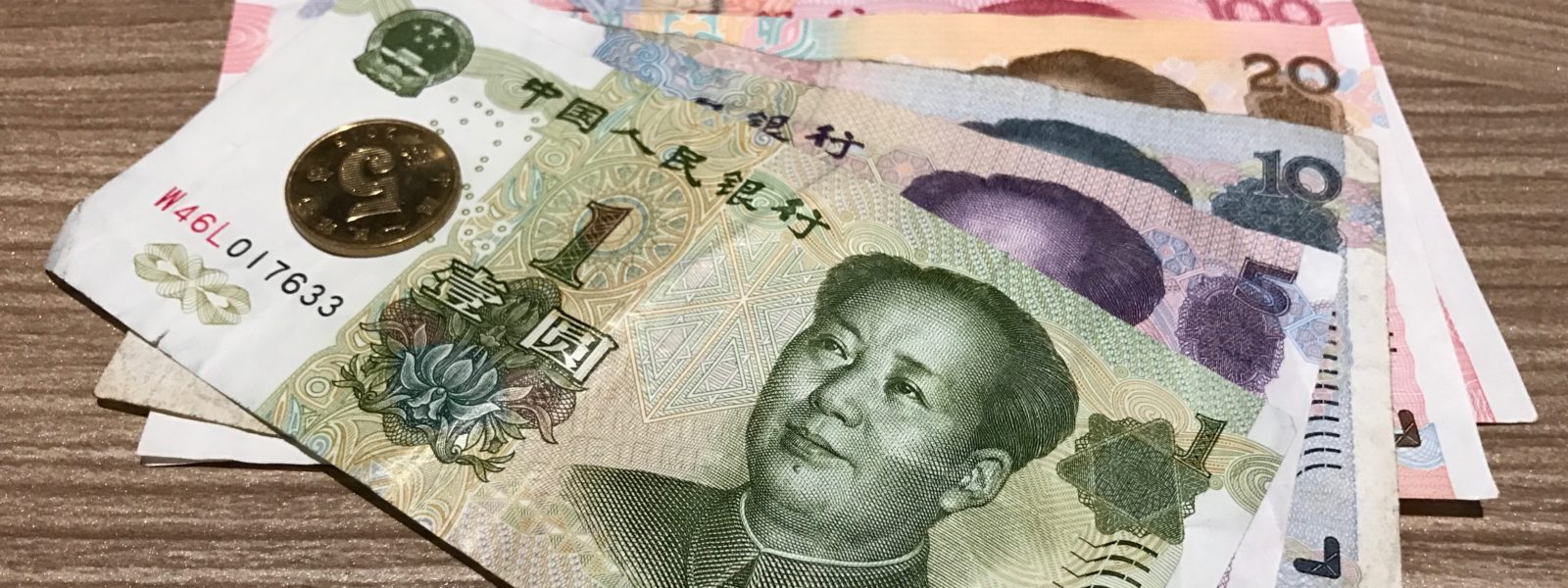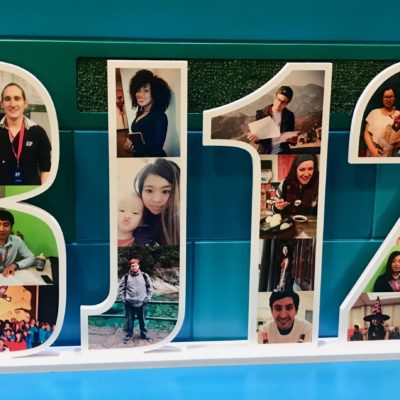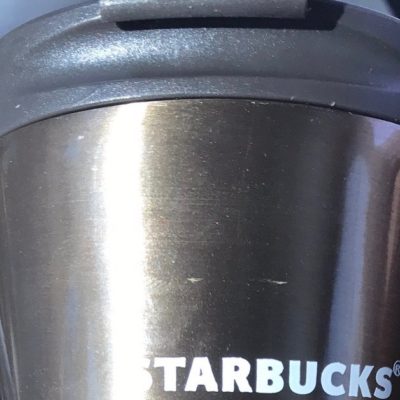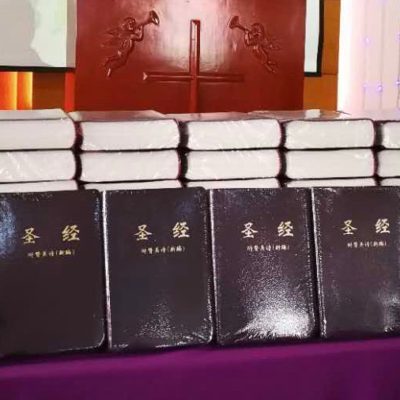January 3, 2017
8:30 pm
Beijing, China
I’m going to talk about a thing that isn’t supposed to be talked about. You know the three things that you’re not supposed to talk about, right? Politics, religion, and money. Okay, so I already broke that rule. The first one, I did a short blog about when the elections occurred, but I tried to be fairly unbiased. Obviously, I break the second one almost every time I post. I don’t think there are many blog posts where I don’t mention Abba at least once. So I guess it’s just right for me to break the rule yet again and talk about money.
Today, I finally set up my budget. While I’d been somewhat trying to keep my spending in mind these past two months, I didn’t actually have a spending plan set out. I had an excuse, of course—I wasn’t exactly sure how much of my money was going to land in my pocket at the end of each month. Because of my arrival date at EF, I didn’t get paid at the end of October. As a result, when I did get paid at the end of November, I actually got wages for about a month and a half. From that, it was a little hard to figure out what exactly I was going to be paid each month. Just so you all know, I am aware that this is a really dumb excuse for not budgeting. I could have done the math and taken the initiative. I am well aware of this and have now attempted to remedy it. For my budget, I only used what I just got paid to determine what I could spend in each category I’ve established. All of my extra money from my October/November paycheck was put into my savings.
So let’s talk a little about money in China and the words we use over here. The official currency in China is RenMinBi (RMB), which means “The People’s Currency” in Chinese. It’s also officially referred to as Yuan (元). So, if you see a price tag in China it will usually say “RMB: 10”, “10RMB”, or “10元.” While those are the official names of the currency, most people don’t say them. The colloquial term is kuai. Here in China—and everywhere else in the world except the USA—tax is added directly onto the price, so the price you see is the price you pay. As such, most items you buy are a full kuai. There are times, though, where you have “cents” added on. In China, 10 “cents” is a jiao. There is nothing less than 1 jiao that I’ve seen so far. So if you’re shopping and your total comes out to 136.50RMB, the cashier will say, “yi bai san shi liu kuai wu (一百三十六块五).”
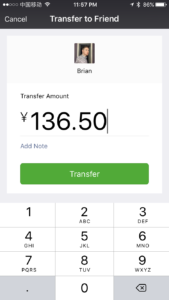 If you gave her cash, you’d give her what you see in the featured picture. As you can see, the cash here is very colorful and each bill is a different size so that it’s easier to distinguish between bills. Although they have cash, a lot of people tend to use WeChat or Alipay. In China, WeChat is essential. It’s an app for your phone that allows you to send messages, update a social media feed, and do other things. If you have it attached to your bank card, like I do, you can pay at checkouts, order food, buy movie tickets, and even pay your phone bill. WeChat is so popular here, I actually paid my rent with it on Sunday. Basically, it’s what FaceBook and ApplePay want to be, they just haven’t figured it out yet. So, in reality, most people who spent that much at the store would pay like this —>
If you gave her cash, you’d give her what you see in the featured picture. As you can see, the cash here is very colorful and each bill is a different size so that it’s easier to distinguish between bills. Although they have cash, a lot of people tend to use WeChat or Alipay. In China, WeChat is essential. It’s an app for your phone that allows you to send messages, update a social media feed, and do other things. If you have it attached to your bank card, like I do, you can pay at checkouts, order food, buy movie tickets, and even pay your phone bill. WeChat is so popular here, I actually paid my rent with it on Sunday. Basically, it’s what FaceBook and ApplePay want to be, they just haven’t figured it out yet. So, in reality, most people who spent that much at the store would pay like this —>
Okay, now that we’ve gotten that out of the way, let’s actually talk about my budget. While it would seem low in comparison to US wages, I get a pretty decent salary based on the cost of living in China. My contracted salary (before taxes) is about twice as much as the average salary for Beijing, so I can live pretty well here. For the moment, EF removes 2,500RMB from my salary each month to repay an advance pay “loan” I was given to help with moving expenses. This will come out of my paycheck until March. Additionally, the government takes out taxes and about 600RMB for social insurance. As of this month, I received a little under 10,000RMB. So let’s look at how I broke down my budget.
Food here is pretty inexpensive, so I usually don’t spend too much money on it. Maybe 20块 for lunch and 15块 for dinner? My most expensive “food” item is coffee. I like my good coffee. I will irresponsibly spend 35块 on a large latte. I hate myself for it, especially since we have free, not-so-great-but-doable coffee at work. If I spent that much on lunch, dinner and coffee, I’d be spending about 70块 a day. Usually, I don’t spend that much. I splurged a bit this week and got pizza, which is Western food so it is expensive. At this point, I feel that it’s important to mention that, living in Beijing, I can fairly easily live an “American” lifestyle here. I do live on the outskirts of the city, so it would take a little more work than my friends who live further into town, but I could definitely do it. There are lots of Western food options and clubs and other expat-friendly places here. I don’t usually spend a lot of time or money on those places, but you can easily do it. Just remember, it comes at a price. Since I don’t do a lot of Western food, but do like my Western coffee, my budget for food is 2,000块 a month.
There are a few other categories for which I have budgeted amounts, so I’m going to have to watch what I actually spend this month. For transportation I have 300块. I live only a few bus stops away from work and it only costs me 2块 a day to get to work and back. That said, going into the city does cost about 15块 round-trip. Still, I don’t think there’s much chance that I’ll use 300块, but we’ll see. My phone is paid off, so the only thing I have to pay there is for my data and minutes. I don’t really use voice minutes and actual texting isn’t really a thing here. As a result, most of my money goes to data, which is actually really cheap. I think 50块 will get me through a month. For entertainment I put 500块. This will include the ski trip I’m taking tomorrow, going to the movie (ready for Rogue One this weekend!), and any other little things I do. Luckily, touristy things here are fairly cheap or free. This month may go over a bit with Chinese New Year, but we’ll see.
Other budget items are a little more set in stone. I originally thought I would be paying about 4,000块 a month in rent. As it so happens, I’m only paying 2,880块. I’ve set aside the other 1,120块 to cover my utilities (only 250块 at most), my fapaio for taxes, and any decorating or other essential things. Once again, this may run high this month as I get some more needed items, like a hot plate and shelves for my bathroom. My tithing/offering is, of course, 10% of my income. I’m saving 1,000块 every month to start building it up (right now I have 2,500). I’m saving up for my flight home by setting aside 667块 a month (recommended by EF). Anything that is left over after I finish the month is going into my “Extra Funds” savings. This will be where I can pull from if I go over a little or want to do something really special. There’s currently 1,389.67块 in there from the past month. Finally (I know it’s not on the table), I have a savings of 10,000块 which I got in reimbursements from all the things I needed to do before I got here. I’m determined not to touch this money!
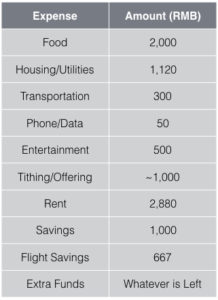 So here’s what my current budget looks like. Hopefully I’ll see some places where I overestimated and can cut back. It’ll also be really nice to start getting that extra 2,500块 in March. The plan is to go ahead and save all of that as well. I really want to save as much as I can from this adventure. Although it’s not the best paying job, I want to be able to start preparing for the future, even if it means I need to tighten my belt a few notches right now. I’ll keep you guys updated on how I’m doing.
So here’s what my current budget looks like. Hopefully I’ll see some places where I overestimated and can cut back. It’ll also be really nice to start getting that extra 2,500块 in March. The plan is to go ahead and save all of that as well. I really want to save as much as I can from this adventure. Although it’s not the best paying job, I want to be able to start preparing for the future, even if it means I need to tighten my belt a few notches right now. I’ll keep you guys updated on how I’m doing.
Now I better go to bed because I have a ski trip planned bright and early tomorrow morning.
Goodnight,
Kristen
